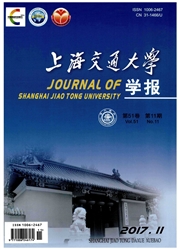

 中文摘要:
中文摘要:
针对淬硬轴承钢在硬切削过程中产生的锯齿状切屑,建立了基于Abaqus/Explicit的正交切削热-力耦合有限元模型,仿真分析了AISI52100轴承钢在低、高速切削条件下锯齿状切屑的形成过程,其随时间变化的应力场、温度场和网格变形及其绝热剪切机理.结果表明:切削淬硬轴承钢时,首先在刀尖前方形成窄短的水平绝热剪切带;随着前刀面对工件材料的挤压作用增强,水平绝热剪切带由远离刀具的端部沿剪切平面扩展到自由表面;随着绝热剪切带的继续滑移,逐步形成了锯齿切屑而促使裂纹产生;切削速度效应加速了剪切带与自由表面交界处微裂纹的产生,并使微裂纹向刀尖扩展;第2变形区的摩擦对锯齿切屑起到了增强作用.
 英文摘要:
英文摘要:
A thermal-mechanical orthogonal cutting finite element model(FEM) was established by Abaqus/Explicit to explore the saw-tooth chip formation process and mechanism in hard turning AISI 52100 steel.The observation of stress distribution,temperature distribution and mesh distortions along cutting time in high and low speed machining processes contributes to demonstrate the adiabatic shear mechanism of saw-tooth chip formation process of AISI 52100 bearing steel.Firstly,a short horizontal adiabatic shear band initiates in front of the rake face;the short band gradually extends to the free surface from the end of the shear plane as the rake face advances to push the work material more severely;saw-tooth chip forms as the adiabatic shear band slides."Adiabatic shear" is the primary mechanism to form saw-tooth chip morphology in machining AISI 52100 bearing steel,crack initiates after the formation of adiabatic shear band;cutting speed is the driving force of the micro-crack initiation in shear band and subsequent propagation to the tool tip.The friction condition in second shear zone strengthens the tendency of saw-tooth chip formation process.
 同期刊论文项目
同期刊论文项目
 同项目期刊论文
同项目期刊论文
 Experimental study on surface residual stress scatter of bearing steel produced by sequential grindi
Experimental study on surface residual stress scatter of bearing steel produced by sequential grindi 期刊信息
期刊信息
